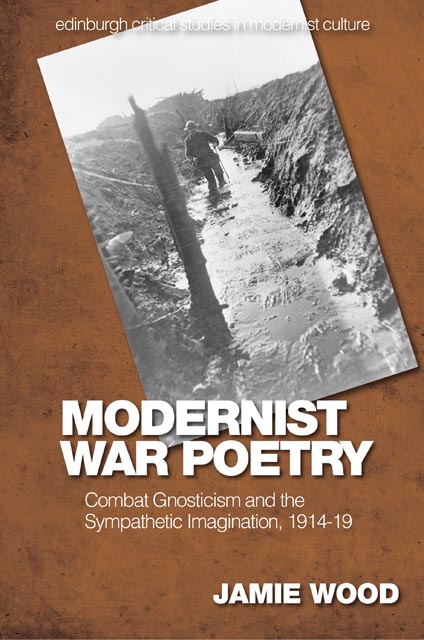Book contents
- Frontmatter
- Contents
- Timelines
- Acknowledgements
- Series Editors’ Preface
- Introduction
- 1 Early Modernist Responses to Combatant Poetry: 1914–Spring 1915
- 2 Reassessing Disaster: 1915
- 3 The Three Lives of Gnosticism: 1916–Summer 1917
- 4 An Emergent Critique of War Experience: Autumn 1917–Spring 1919
- 5 The Form and Practice of Modernist Distaste: Summer–Autumn 1919
- Conclusion
- Bibliography
- Index
2 - Reassessing Disaster: 1915
Published online by Cambridge University Press: 13 April 2023
- Frontmatter
- Contents
- Timelines
- Acknowledgements
- Series Editors’ Preface
- Introduction
- 1 Early Modernist Responses to Combatant Poetry: 1914–Spring 1915
- 2 Reassessing Disaster: 1915
- 3 The Three Lives of Gnosticism: 1916–Summer 1917
- 4 An Emergent Critique of War Experience: Autumn 1917–Spring 1919
- 5 The Form and Practice of Modernist Distaste: Summer–Autumn 1919
- Conclusion
- Bibliography
- Index
Summary
Rupert Brooke, Modernist Piñata
The war’s vicious turn in the months leading up to Easter 1915 left an indelible imprint on modernist cultures. The deaths of Rupert Brooke, Julian Grenfell, Jean Verdenal and then Henri Gaudier-Brzeska occurred within the space of six weeks in that spring. Those months also marked the first use of chlorine gas, the sinking of the Lusitania and an escalation of atrocity stories. Public confidence in the war effort waned and the military finally broke ranks from government policy. Sir John French, the British Expeditionary Force’s Commander-in-Chief, collaborated with the editorial team at The Times on 14 May to describe how British casualties at Aubers Ridge resulted from a series of shell shortages. The question of institutional culpability accelerated a week later with the Quintinshill rail disaster. Following a signalling problem, five trains collided and became engulfed by a gas fire in what is still the worst rail accident in British history. Over 200 victims, including troops, were trapped alive or splintered by shrapnel. Charlotte Mew’s ‘May, 1915’ (first published 1929), composed the day after Quintinshill, the day also of Ezra Pound’s first concrete reference to the evolution of his long poem, captured this historical moment. The poem implores readers to hold on to the hope that the natural world, marked by the arrival of spring, will provide some rearrangement to the order of things. Despite this, its opening confidence progressively leaks away into melancholia. We can see the idea that the war might be quick or civilised leeching out of English society in ‘May, 1915’, especially when the unavoidable reality of the body in pieces stood in the way of poetry.
It was within this mood of mounting anxiety and anger that Brooke rose to public fame and poetic ignominy. There was an element of fortuity in this. Although Brooke drafted his series of famous war sonnets, ‘1914’, in the autumn and finished them in early 1915, the January edition of New Numbers in which they first appeared was not in circulation until February 1915 at the earliest. The TLS published several sonnets under Walter de la Mare’s patronage although not until 11 March. This set the stage for Dean Inge’s famous canonisation of Brooke’s (alleged) religiosity in his Easter Day sermon at St Paul’s Cathedral. The Times duly recorded Inge’s sermon and established Brooke’s fame in the popular imagination.
- Type
- Chapter
- Information
- Modernist War PoetryCombat Gnosticism and the Sympathetic Imagination, 1914-19, pp. 53 - 89Publisher: Edinburgh University PressPrint publication year: 2022



